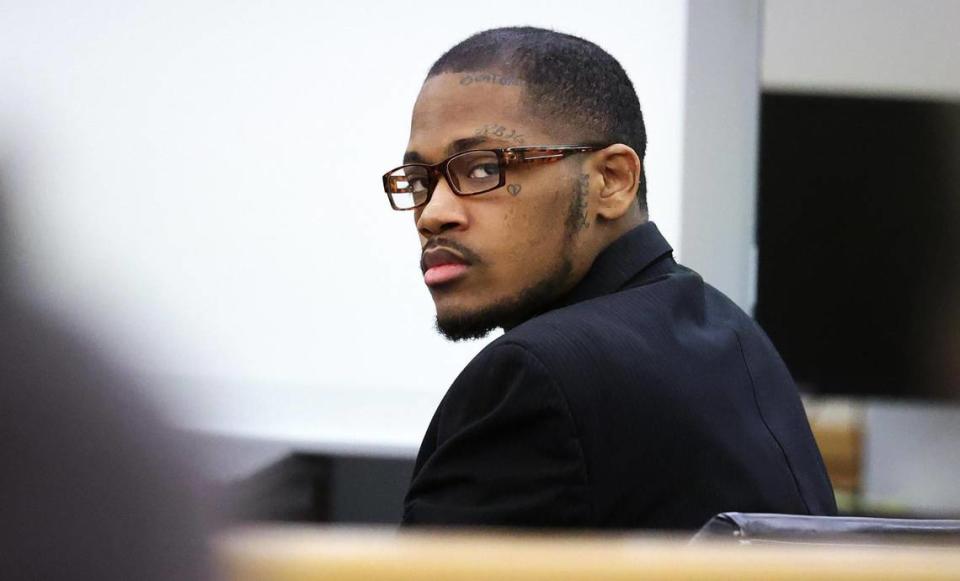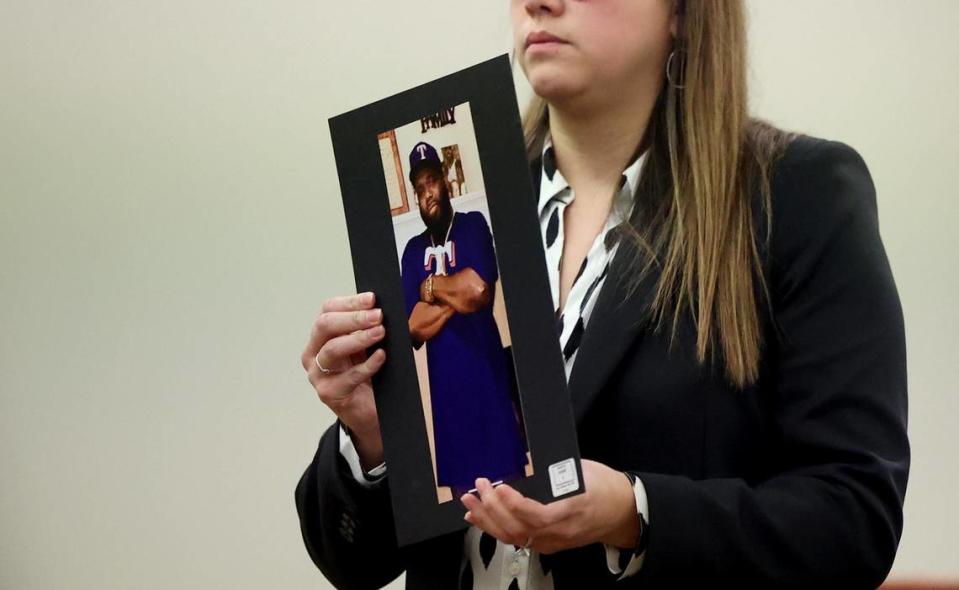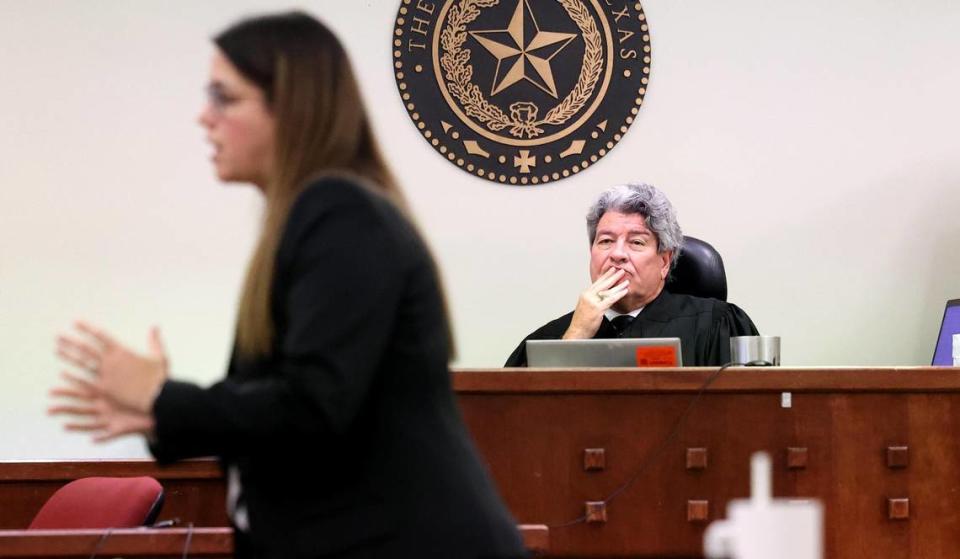In killing plot from jail, Fort Worth Crips gangster who stirred terror sentenced to life
The black Chrysler 200 was parked for 11 minutes on Belshire Court as the sun lowered in the sky.
A woman whose thoughts were clouded by weed was in the driver’s seat. In the back, Damond Cotton was ready with a rifle that was attached to a device that would soon catch ejected casings when the cartridges flung like popcorn kernels from the gun.
Through the windshield they could see across to a house, near Fort Worth’s southern border with Everman, where Cotton’s target lived.
Kevin Brown, who was 47, walked with a cellphone down his driveway to a mailbox encased in a brick column and peered inside.
He withdrew nothing, closed the door of the mailbox and stood beside it, the phone to his ear.
The sedan’s driver steered around the corner and slowed. Cotton leaned from the rear passenger-side window and released a torrent of riflefire. Brick particles floated in the air. One of the rounds tore into Brown’s head.
Today's top stories:
→ Fort Worth ISD memorializes employee killed outside elementary school
→ 13-year-old sentenced to 12 years for murder of Sonic employee
→ Fort Worth police officer arrested on domestic violence charge
🚨Get free alerts when news breaks.
Blood spread from his body stretched near where the driveway meets the street. Next door, a neighbor paused working in his yard as the car from which Cotton fired took off.
At first, the police theorized that Kevin Brown was killed because of his son, Braylin Brown. In a sense, he was, although not in the way homicide detectives initially thought.

Braylin Brown, documented by Fort Worth police as a Crips street gang member and monitored as a person connected to the Rolling 60s, one of 38 Crips sets in the city, held feuds with members of other gangs that made him a possible target of violence. In jail on Jan. 25, 2022, the day of his father’s killing, Braylin Brown was inaccessible, but his relatives were available to people who meant him harm.
Surveillance camera video recordings of the shooting suspect’s vehicle led an officer in the Real Time Crime Center to review images of license plates attached to the Chrysler 200 when it was spotted by city cameras driving elsewhere. The registered owner then led police to the driver, Ashlynn Durham, and to Cotton.
When police executed a search warrant at an apartment where Cotton lived, they found handwritten letters that investigators said Cotton wrote to Braylin Brown. The letters suggested a friendly relationship between Cotton and Braylin Brown, and led Fort Worth police homicide Detective Michael Sones to a new theory. Perhaps Braylin Brown wanted his father dead and arranged for Cotton to kill him.
The slaying’s motive, prosecutors argued, was found in a secret sexual relationship Kevin Brown Sr. had with Rebecca Willis, who had also had such a relationship with Braylin Brown’s brother Kevin Brown Jr.
Willis has children with both men. (Kevin Brown Jr. was shot to death by a person whom he was robbing.)
Willis, who was at Kevin Brown Sr.’s side when the first officer arrived, falsely told the officer that Brown Sr. was her father.
The scandalous affair, in which two men shared a name and a sex partner, meant that his father was “grimey,” Braylin told others.
The letters from Cotton suggested the homicide’s motivation was far more horrid than the initial retaliatory drive-by explanation.
Detective Sones concluded that Braylin Brown, from the Tarrant County Jail, had ordered a hit on his father.
In jail tablet messages and phone call records, prosecutors presented evidence they suggested showed Braylin Brown discussed in coded language how the killing was to happen and instructed a girlfriend to buy bullets and get them to Cotton. In the messages, Brown referred, for example, to a gun as a controller and ammunition as pieces of the controller.
Indeed, in a three-way phone call he urged his father to check the mailbox in the seconds before he was shot to death.
A jury in the 396th District Court in Tarrant County on Wednesday sentenced Brown to serve life in prison. Last week, in the trial’s guilt-innocence phase, it found the 22-year-old defendant guilty of murder in his father’s death.

The sentence appears to have ended a violent criminal spasm in Fort Worth for which law enforcement authorities allege Braylin Brown is responsible, including another murder and the shooting of an innocent grandmother in her 60s as he intend to shoot a rival.
“He is a hardened, violent gang member,” prosecutor Katie Owens said in closing argument in the trial’s punishment phase. “That’s who he is.”
In the trial that took place over parts of eight days, Owens presented evidence with Tarrant County Assistant District Attorney Matt Rivers. Steve Gebhardt and Brian Eppes represented Brown.
The jury deliberated for about three and a half hours hours on a sentence. It considered a term of between 15 to 99 years or life.
Killer rejected plea deal for 50 years
In February, Braylin Brown stood before Judge George Gallagher to announce whether he wanted to accept or decline a plea offer from the state.
“Your Honor, at this time the offer is 50 years on those cases. Those would run concurrent,” prosecutor Owens said, standing near the bench.
After he explained how an arrangement known as a plea in bar works, Judge Gallagher suggested it was time for Brown to decide.
“So do you want to take it or are you ready to go back?
“The other thing you need to think about is at your age this would put you back in control of your life, and it would be up to you to be able to behave in order to get parole. I can’t tell you how long parole would take. I can tell you on a 50-year sentence, you’ve got to do 25 years flat. But you’ve done how long? How long have you been in jail?

“Two — two years,” Brown answered, with attorneys Eppes and Brian Salvant at his side.
“All right. So you’ve got two years off that — you’ve got two years off that 25. So that would means 23, potentially you’d be 45 when you get out versus I’m going to die in prison. But I can’t promise you’d get out at 45. That’s up to the folks in Austin. Nobody here has control over that. You’re the one in control of it. If you don’t get in any trouble down in [prison], the likelihood is as young as you are, you’ll get paroled.”
Brown struggled with his choice.
“I ain’t going to lie, it’s hard,” he said.
“I’m sorry? the judge replied.
“I said, ‘I ain’t going to lie, it’s hard,’” Brown said.
“It is hard. It is hard. I tried the case against Mr. Robinson,” the judge said of Adrian Robinson, who shot to death a 17-year-old girl to win notoriety and respect within his gang and was found guilty in October 2022 of gang-murder and gang-deadly conduct in the rifle killing of Cheyenne Moore.
“I know you did,” Brown said.
“I gave him 75, “ the judge said. “And I think you’ll hear that I’m not real — I try to be fair in punishment. But it’s some bad stuff that y’all are accused of doing,” Gallagher said.
“Twenty-five years is a long time,” the defendant replied.
“It is. I agree. But you’re rolling the dice. And again, I’m not trying to force you to do something that you don’t want to do. I’m just telling you, here’s what the deal is. And I need a decision.”
“I’m going to reject the deal, Your Honor,” Brown said.
Thirteen days later, according to the district attorney’s office, Brown threatened to kill Salvant, his defense attorney. Salvant withdrew from the case.
This is a developing story. For the latest updates, sign up for breaking news alerts.


